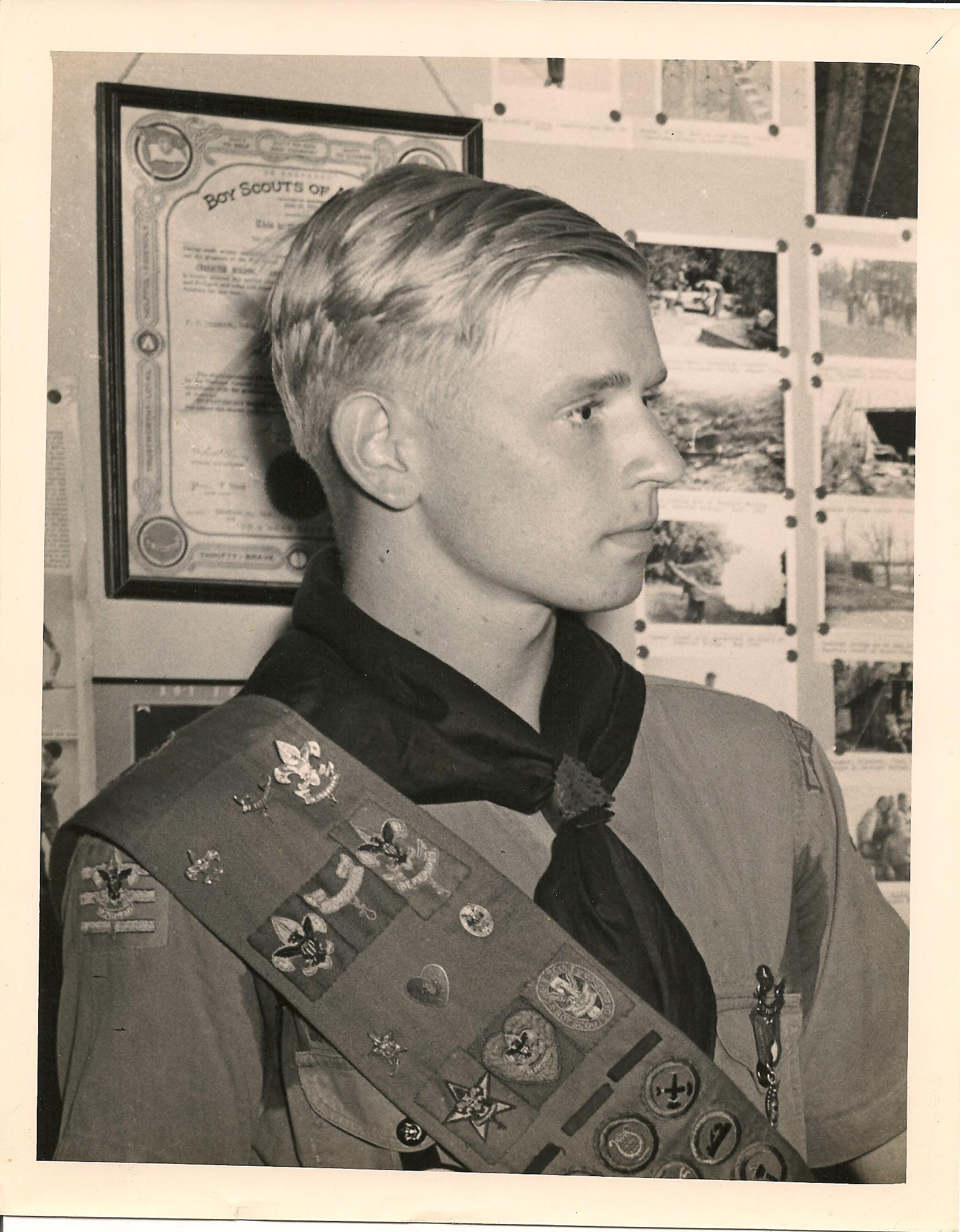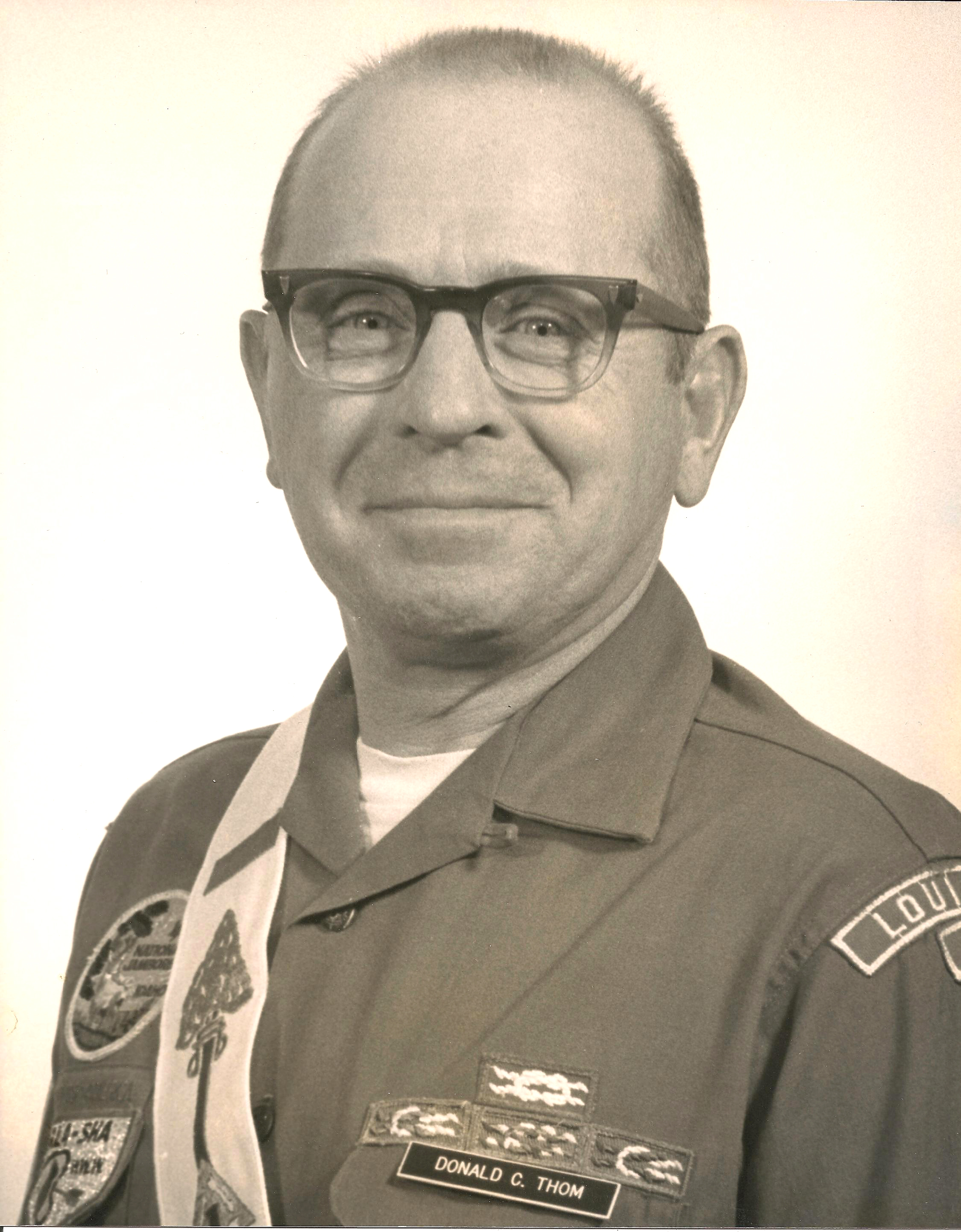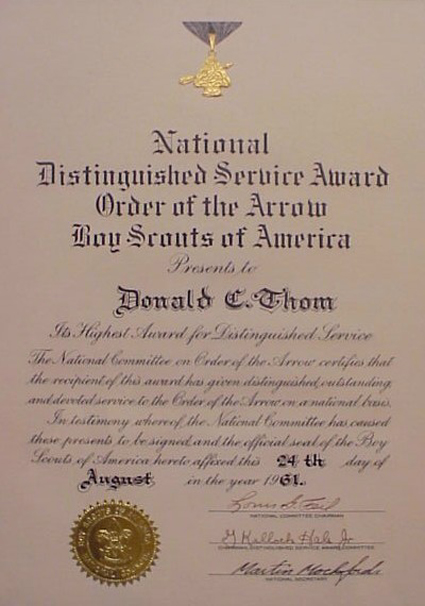The fundamental values of both the Boy Scouts of America (BSA) and the Order of the Arrow (OA) have continued to grow and prosper over the years due in large part to certain individuals whose personal involvement and commitment have greatly enhanced these programs. Donald C. “Don” Thom (rhymes with “dome”) is certainly one of these individuals.
 Don Thom was born and raised in Louisville, Kentucky during the height of the Great Depression. As an only child, Don was a bit shy and kept to himself a lot during his earlier years. However, at the urging of his father, Don agreed to visit a local Scout troop on one of their meeting
Don Thom was born and raised in Louisville, Kentucky during the height of the Great Depression. As an only child, Don was a bit shy and kept to himself a lot during his earlier years. However, at the urging of his father, Don agreed to visit a local Scout troop on one of their meeting nights. Even though this initial troop experience left Don a little reluctant at first, he eventually entered the Scouting program at the age of 12 in December of 1938 after visiting a second troop in the neighborhood. Don quickly overcame his shyness and became a very active member of the troop earning the God and Country Award and his Eagle Scout Award in 1943. It was not long before Don gave service back to the troop by becoming its Junior Assistant Scoutmaster for several years just prior to his serving in the Navy. After fulfilling his naval duties, Don eventually returned to the troop serving as its Scoutmaster for 12 years.
nights. Even though this initial troop experience left Don a little reluctant at first, he eventually entered the Scouting program at the age of 12 in December of 1938 after visiting a second troop in the neighborhood. Don quickly overcame his shyness and became a very active member of the troop earning the God and Country Award and his Eagle Scout Award in 1943. It was not long before Don gave service back to the troop by becoming its Junior Assistant Scoutmaster for several years just prior to his serving in the Navy. After fulfilling his naval duties, Don eventually returned to the troop serving as its Scoutmaster for 12 years.
Don’s association with the OA began in 1946 when he was inducted as an Ordeal member of Zit-Kala-Sha Lodge. The ceremony was conducted at Camp Covered Bridge near Prospect, Kentucky. It was also at this camp where he received his Brotherhood Honor in 1949 and the Vigil Honor in 1952. Don’s Vigil Honor name is Achgigwit, which means ‘Lively One’. Don was extremely active as a young adult in the Order of the Arrow, even serving as lodge chief. He attended his first National Order of the Arrow Conference (NOAC) in 1948, and it was there that he first saw Scouts performing Native American dancing.
Don brought this experience back to his own lodge, and in the summer of 1949, Don and four other lodge members started the Wawoyaka Dance Team. Wawoyaka means ‘Story Teller’ in the Sioux language. The Wawoyaka Dancers gained recognition in the local area, as well as throughout Region Four. As a young adult, Don was a member of this champion dance team, and it was this pursuit that led him to first recognize the need to study and respect Native American culture.
D on’s local service to the Order of the Arrow continued as an adult leader. He served as the lodge adviser of Zit-Kala-Sha Lodge for 20 years, as well as serving as the Area 4B adviser. His involvement was noticed at a national level, and he was on the ‘short list’ of candidates to succeed J. Richard Wilson as OA Executive Secretary. Don received the Silver Beaver Award in 1955 as recognition for his local service. Don continued his attendance at national events where he involved himself in anything associated with Native American activities. Don was asked to serve as the Assistant Scoutmaster of the OA Service Corps at the 1960 National Jamboree, and it was this service that led to his receiving the Order of the Arrow’s Distinguished Service Award (DSA) in 1961. Don continued to serve with the OA Service Corps at National Jamborees in the following leadership positions: 1964 Assistant Scoutmaster; 1977 Scoutmaster; 1985 Director and 1989 Director. Don also served as the Director of the OA Indian Village at the 1993 National Jamboree.
on’s local service to the Order of the Arrow continued as an adult leader. He served as the lodge adviser of Zit-Kala-Sha Lodge for 20 years, as well as serving as the Area 4B adviser. His involvement was noticed at a national level, and he was on the ‘short list’ of candidates to succeed J. Richard Wilson as OA Executive Secretary. Don received the Silver Beaver Award in 1955 as recognition for his local service. Don continued his attendance at national events where he involved himself in anything associated with Native American activities. Don was asked to serve as the Assistant Scoutmaster of the OA Service Corps at the 1960 National Jamboree, and it was this service that led to his receiving the Order of the Arrow’s Distinguished Service Award (DSA) in 1961. Don continued to serve with the OA Service Corps at National Jamborees in the following leadership positions: 1964 Assistant Scoutmaster; 1977 Scoutmaster; 1985 Director and 1989 Director. Don also served as the Director of the OA Indian Village at the 1993 National Jamboree.
Don’s love for Native American culture, as well the need to study and respect it never weakened from his days as a young adult dancer. He personally dedicated himself to associations with American Indian groups such as the American Indian Scouting Association, and in so doing brought that commitment to the Order of the Arrow, and especially to the National OA Conferences. Don became a member of the National OA Committee in July of 1974, and shortly thereafter he became the Lead Adviser for American Indian Events. He remained in that capacity through the 1996 NOAC. Although he missed the 1974 event, Don was not only instrumental, but the driving force behind the planning and hosting of the 1978, 1980, 1982, and 1984 National Indian Seminars, as well as the 1987 National Pow Wow, and the 1995 Philmont Retreat. Don was also instrumental in the drafting of the OA’s Protected Feather Clarification Policy of 1976, which restricted the use of feathers and animal parts in the construction of Native American regalia to only that of domesticated and game birds. This policy kept the BSA/OA in good standing with the U.S. Fish and Wildlife Service.
Throughout the 1980s and the early 1990s, Don's wife Carolyn Jaegers Thom also played an important role in the success of numerous OA sponsored American Indian events and activities. Ms. Thom assisted Don at NOACs, National Indian Seminars, and Pow Wow's by coordinating event details, chaperoning Miss Indian America, and by providing transportation for invited Native American guests. The National OA Committee recognized her many years of volunteer dedication and service to the Order of the Arrow by presenting her with the Order's Red Arrow Award in 1992.
Don attended every National OA Conference from 1948-1998, plus one more in 2002. He also attended eight National Jamborees and one World Jamboree from 1950-1993. In all of these events, Don’s leadership in service has been exemplary. Since his induction in 1946, Don unceasingly provided service to the Order of the Arrow for over a half century. His lifetime of service has forever linked the mission of the Order of the Arrow with the Native American heritage on which it was founded. In 2014, in recognition of his years of service, Don Thom received the Silver Antelope Award.